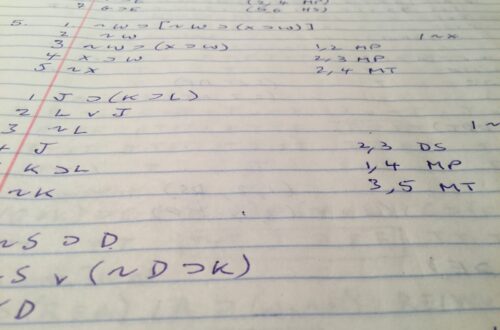As I argued the other day, there are some people who think reality is underwritten by various norms. I call them normativists. For example, a normativist will think that there are ethical principles that are objective, universally binding, and immutable. As I suggested, normativists will also think this about the rules of grammar – they are objective rules to be discovered not conventions to be created.
Today I came across an article that suggests that the normativist is wrong about when it comes to logic:
…logic has developed over a long time, and it is likely to continue developing. Currently, non-classical logic is working to fix some of the things that are wrong with classical logic and the normative status of logic is being disputed… So, although we like to think some things have always been the same and will never change – perhaps logic isn’t one of them. The field hasn’t always been what it is today – so why do we expect it to stay the same?
The author argues that since logical systems have changed over time, we should be doubtful that logic has normative status. The argument is similar to the argument of a scientific anti-realist. The scientific anti-realist will contend that since scientific observation reaches different and contradictory conclusions over time, we should not think the conclusion we have reached in the present reflects reality:
- At t1 the best scientific minds agreed that p.
- At t2 the best scientific minds agreed that ~p and that q.
- Therefore, we should withhold judgment that q.
Analogously, the author of the article argues that the conclusions of philosophers about logic have changed over time and we should consider the changes to indicate the non-normative status of logic itself.
Unfortunately, on its own, the author’s argument does not support the conclusion that logic is non-normative. In contrast, to the scientific anti-realist argument, it is very difficult to show that different approaches to logic contradict each other. In fact, in most introductory logic books one finds each historical period of history taught successively, from Aristotle’s system, to propositional logic, usually ending with higher order or ‘predicate’ logic. As one works one’s way through, one is hard pressed to find explicit (or even implicit) contradictions between two systems.
That’s not to say that human understanding of logic hasn’t changed over time. For example, on an Aristotelian approach to logic, universal statements imply existence. “All unicorns are creatures with one horn” implies the existence of unicorns. We can then use the universal to generate the statement, “Some unicorns have one horn.” We don’t think that now and generally take universals not to imply existence (“for any x, if x is a unicorn, then x will have one horn”). But this is not system wide nor does it entail that the nature of logic itself changed over time. This change is compatible with logic being immutable and our understanding of logic changing.
At best, the author’s argument tells us that logic is complex and that we change and expand our view of its nature and application over time. But this is a far cry from the claim that logic itself evolves or that logic is unreal or only instrumental. It certainly doesn’t show that it is relative.
There are some philosophers who offer substantial arguments in favor of the view that logic is non-normative, most famous among them is Graham Priest. He argues that there are paradoxes in logic that entail that laws of logic that we take for granted are not as normative as we might think. See his defense of dialetheism here and listen to an interview about Priest’s views on Buddhism here.


